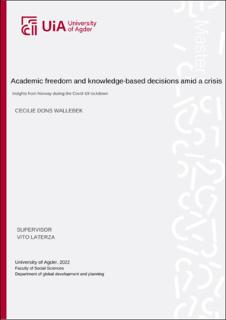| dc.description.abstract | When the world was hit by the pandemic Covid-19, The Norwegian government opted for a national lockdown in March 2020. Press conferences were held, and central authorities spoke to the country with a focus on togetherness and a shared commitment through dugnad. Decisions were made amid an urgency and a scientific knowledge gap; there was not yet enough research and knowledge about the virus. Nations around the world chose different strategies. Communication forms, and use of restrictions and guidelines varied.
The importance of academic freedom and knowledge-based decisions may become clearer in times of emergencies. Through interviews with central actors from one region in Norway, this project provides insight into how the lockdown has made challenges and structures visible.
Mutual trust between the government and the civil society creates an atmosphere of collaboration in the country. Critical voices seemed few during the lockdown period. A shared notion of common effort made implementing governmental policies efficient. The cultural context and the social mechanisms during the lockdown period included aspects related to the Nordic Model, the welfare state, dugnad, and the Law of Jante. These are some of the aspects that affected academic freedom, production of knowledge and scientific consensus processes towards knowledge-based decisions. | |
